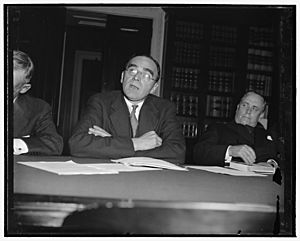Morris Ernst facts for kids
Quick facts for kids
Morris Ernst
|
|
|---|---|
 |
|
| Born | August 23, 1888 |
| Died | May 21, 1976 (aged 87) |
| Alma mater | Williams College; New York Law School |
| Occupation | Attorney |
| Known for | Civil liberties litigation |
Morris Ernst (August 23, 1888 – May 21, 1976) was an important American lawyer. He was known for defending people's rights, especially their right to privacy and freedom from censorship. He worked a lot with the American Civil Liberties Union (ACLU), a group that protects civil liberties.
Ernst helped stop books from being banned, like Ulysses by James Joyce. He also supported the right of workers in media to form labor unions. He believed in protecting individual freedoms for all Americans.
Contents
Early Life and Education
Morris Leopold Ernst was born in Uniontown, Alabama, on August 23, 1888. His family was Jewish. His father, Carl Ernst, came from what is now the Czech Republic. His mother, Sarah Bernheim, was the daughter of German immigrants.
When Morris was two, his family moved to New York City. They lived in Manhattan, where his father ran a store. Morris went to the Horace Mann School. He then graduated from Williams College in 1909. He studied law at night at New York Law School and became a lawyer in 1913.
A Career Fighting for Rights
Morris Ernst started his law practice in New York City. In 1915, he helped start a law firm called Greenbaum, Wolff & Ernst. He joined the board of the American Civil Liberties Union (ACLU) in 1927. He became one of the most successful lawyers for the ACLU from the 1920s to the 1960s.
From 1929 to 1954, he was a main lawyer for the ACLU. He became the vice chairman of the ACLU's board in 1955. Ernst was very good at using the media to share information about his cases. He also knew how to explain complex topics to people in court.
Protecting Books and Ideas
In 1933, Morris Ernst took on a big case. He defended James Joyce's novel Ulysses against charges that it was "obscene." He won the case, which meant the book could be published in the United States. He also won similar cases for other books, like The Well of Loneliness and Casanova's Homecoming. These wins were important for freedom of speech and what people could read.
Supporting Workers' Rights
In 1937, Ernst argued a case in the Supreme Court. He represented the American Newspaper Guild. He successfully argued that media employees had the right to form labor unions. This decision was a big step for workers' rights across the country.
Working with Leaders
Morris Ernst became good friends with important people. He was close with Justice Louis Brandeis. He also had strong friendships with Presidents Franklin D. Roosevelt and Harry S. Truman. New York Governor Herbert H. Lehman was also a friend.
Besides politicians, he knew many famous artists and writers. These included Edna Ferber, E. B. White, and Groucho Marx.
In 1946, President Truman asked Ernst to join the President's Committee on Civil Rights. This committee worked to protect the rights of all Americans.
Personal Life
Morris Ernst married Susan Leerburger in 1912. They had a son who died young and a daughter. Susan passed away in 1922. In 1923, Ernst married Margaret Samuels. They had a son and a daughter together. Margaret died in 1964.
Ernst loved sailing and had a summer home in Nantucket, Massachusetts. He passed away at his home in New York City on May 21, 1976. He was survived by his son, both daughters, and five grandchildren.
Morris Ernst's important papers are kept at the Harry Ransom Center at the University of Texas at Austin.
Published Works
Morris Ernst wrote many books during his life. Here are some of them:
- Hold your tongue!: Adventures in Libel and Slander (1932)
- America's Primer (1931)
- The Ultimate Power (1937)
- Too Big (1940)
- The Best is Yet: Reflections of an Irrepressible Man (1945)
- The First Freedom (1946)
- So Far, So Good (1948)
- Touch Wood: A Year's Diary (1960)
- Untitled: The Diary of my 72nd Year (1962)
- A Love Affair with the Law (1968)
- Utopia 1976 (1969)
- The Great Reversals: Tales of the Supreme Court (1973)
 | Emma Amos |
 | Edward Mitchell Bannister |
 | Larry D. Alexander |
 | Ernie Barnes |

